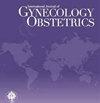Psychometric analysis and validation of the SF‐34 PREG: An adaptation of the SF‐36 for assessing quality of life in pregnant women
IF 2.6
3区 医学
Q2 OBSTETRICS & GYNECOLOGY
引用次数: 0
Abstract
ObjectiveThis study aims to perform a psychometric analysis of the 36‐item short form health survey (SF‐36) in a population of pregnant women and validate an adapted version of the instrument to measure health‐related quality of life specific to pregnancy.MethodsA cross‐sectional study design was carried out with data collection between 7 and 36 weeks of gestation, with a total sample of 547 pregnant women divided into two randomized subsamples. Data were collected between September 2021 and April 2023. An exploratory factor analysis was initially performed on one subsample, followed by a confirmatory factor analysis on the other. Internal consistency was assessed using Cronbach's alpha and McDonald's omega, and correlations between factors were analyzed.ResultsResults from the exploratory factor analysis proposed a seven‐factor model explaining 56% of the variance. All proposed dimensions achieved Cronbach's alpha scores above 0.75, with a total test score of 0.92. Furthermore, all dimensions exhibited positive and statistically significant correlations. Bartlett's test of sphericity and the Kaiser–Meyer–Olkin test yielded values of 5599 (SF-34 PREG 的心理计量分析和验证:SF-36 的改编版,用于评估孕妇的生活质量
本研究旨在对孕妇群体中的 36 项短表健康调查(SF-36)进行心理计量分析,并验证该调查工具的改编版,以测量孕期特有的与健康相关的生活质量。方法 采用横断面研究设计,在妊娠 7 周至 36 周期间收集数据,将 547 名孕妇分为两个随机子样本。数据收集时间为 2021 年 9 月至 2023 年 4 月。首先对一个子样本进行探索性因子分析,然后对另一个子样本进行确认性因子分析。使用 Cronbach's alpha 和 McDonald's omega 评估了内部一致性,并分析了因子之间的相关性。所有提出的维度的 Cronbach's alpha 分值都超过了 0.75,总测试分值为 0.92。此外,所有维度都呈现出统计意义上的正相关。Bartlett 球形度检验和 Kaiser-Meyer-Olkin 检验的结果分别为 5599(P < 0.001)和 0.871。确认性因素分析再次证实了这一模型具有良好的拟合指数:χ2 792 (P < 0.001)、比较拟合指数(CFI)和塔克-刘易斯指数(TLI)>0.90、标准化均方根残差(SRR)和均方根近似误差(RMSEA)<0.06。SF-34 PREG 显示出高度的可靠性和稳健的因子结构,使其成为评估孕期健康相关生活质量的更精确、更相关的工具。虽然 SF-34 PREG 不包括原始 SF-36 的社会功能维度,但它为这一特殊人群提供了更高的相关性和准确性。建议对 SF-34 PREG 进行进一步研究和临床应用。
本文章由计算机程序翻译,如有差异,请以英文原文为准。
求助全文
约1分钟内获得全文
求助全文
来源期刊
CiteScore
5.80
自引率
2.60%
发文量
493
审稿时长
3-6 weeks
期刊介绍:
The International Journal of Gynecology & Obstetrics publishes articles on all aspects of basic and clinical research in the fields of obstetrics and gynecology and related subjects, with emphasis on matters of worldwide interest.

 求助内容:
求助内容: 应助结果提醒方式:
应助结果提醒方式:


